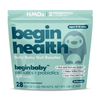Best First Foods for Starting Solids for Good Digestion
share this article
 Starting solids is a big and exciting milestone but can feel overwhelming as you navigate what’s safe, nutritious, and helpful for your growing baby. Since many babies experience constipation when they first start solids, it’s important to choose first foods that prioritize their digestion.
Starting solids is a big and exciting milestone but can feel overwhelming as you navigate what’s safe, nutritious, and helpful for your growing baby. Since many babies experience constipation when they first start solids, it’s important to choose first foods that prioritize their digestion.
Even if your baby is having regular poops, the first few months of solid foods help shape their gut microbiome - an ecosystem of bacteria that plays a major role in digestion, immunity, and overall health.
So let’s break down the best digestive-boosting first foods for your baby starting solids.
What To Look for in a First Food
While digestion is important, it’s just one part of choosing the best first foods. Here are a few key factors to keep in mind.
High in Fiber
Starting solids is one of the most common reasons babies experience constipation (1). Their digestive system is adjusting, their hydration might naturally drop, and they may not be getting enough fiber at first.
There’s no set daily fiber requirement for babies, but aim to offer at least one fruit, veggie, bean, or whole grain at each meal to support regular bowel movements.
High in Iron
At around 6 months, babies need more iron than at any other time in their life. Their natural iron stores from birth begin to run low, so offering iron-rich foods becomes essential. While iron doesn’t directly affect digestion, it’s a critical nutrient when starting solids.
Variety
Variety helps in two big ways: it supports a diverse gut microbiome and expands your baby’s flavor preferences.
Offering a range of foods introduces different types of good gut bacteria for healthy digestion and a strong immune system. Babies are in a sensitive window when starting solids which makes them more open to new tastes which can help shape their food preferences later in life (2).
Prebiotics
Prebiotics are a special kind of fiber that feed the good bacteria in your baby’s gut. They help strengthen the gut lining, regulate poops, and support long-term digestive health. Prebiotics are found in foods like garlic, onions, asparagus, bananas, apples, oats, chia seeds, and beans.
Probiotics
Probiotics are the good bacteria that support gut balance. Baby-safe sources of probiotics include yogurt, kefir, cottage cheese, sauerkraut (in small amounts), and probiotic supplements designed for infants like Beginbaby Prebiotics + Probiotics. It combines a natural prebiotic found in breastmilk (HMO) with two well-studied probiotic strains to support digestion and immune health.
Best First Foods for Good Digestion
Yogurt
Yogurt with live and active cultures is a great source of probiotics, protein, and healthy fat. Serve it plain or mix in soft mashed fruits like banana or pear. Yogurt also helps babies get used to more tart flavors.
Banana (Ripe)
Ripe, soft bananas provide prebiotic fiber that helps nourish the good bacteria in your baby’s gut. Their natural sweetness also makes them a favorite for many babies, especially if your little one seems hesitant to try solids.
Lentils
Lentils are rich in protein, iron, and fiber.They’re especially high in prebiotic fiber, which supports healthy digestion. Serve them soft and scoopable, or mix into mashed veggies for added flavor and texture.
Sweet Potato
Sweet potatoes are gentle on your baby’s tummy and packed with prebiotic fiber. You can serve them well-cooked and mashed or cut into soft wedges for self-feeding. They also blend well with other veggies for a smooth puree.
Chia Seeds
Chia seeds are rich in prebiotic fiber, iron, and healthy fats for healthy digestion and optimal brain development. Avoid serving them dry and opt for pre-soaked chia seeds in yogurt, oatmeal, or breastmilk.
Beans
Beans of all varieties offer prebiotic fiber, protein, and iron. To serve them safely, mash them well or spread on toast.
Oatmeal with Kefir
Oatmeal is a soft, fiber-rich option, and using kefir instead of water or milk adds a gentle probiotic boost. This is a great way to support digestion and get your baby used to more tart flavors.
Tips for Baby’s Digestion
As you’re incorporating these first foods, remember that constipation is very normal as their digestive system is adjusting to these big diet changes. When introducing fiber, start slowly and build your baby’s tolerance, monitoring their poop frequency and softness as you go.
Beyond gut-healthy foods, prioritize hydration and movement to keep their bowels moving. While starting solids, sometimes babies naturally drink less breastmilk or formula, and spend a lot of time in high chairs or being held, so make sure they get the fluids and movement they need.
Summary
Starting solids is an exciting milestone, and choosing fiber-rich, prebiotic, and probiotic foods can help support your baby’s digestion and gut health during this important transition.
By focusing on variety, iron-rich options, hydration, and gentle movement, you can help your baby build a strong digestive system and healthy eating habits from the start.
















